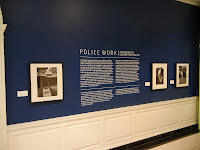Comments/Context: Leonard Freed's documentary photographs of 1970s era New York policemen and women tell a surprisingly even handed, matter-of-fact story about life on the beat. His pictures are less about dramatic moments, dangerous situations, and action-packed heroism, and more about the day-in, day-out life of rough and tumble police work. It's an inside look at the gritty realities of the occupation, its tedium, and the everyday people tasked with the job of trying to control an unruly world.

During these years, Freed actually rode around in patrol cars, spent time in police precincts, and tagged along for arrests and demonstrations. As a result, his photographs have an inside-the-barriers immediacy, often capturing the viewpoint of the officers or catching an unguarded moment during a break in the action. As a group, the pictures are unexpectedly comprehensive: suspects are frisked and handcuffed, bulletproof vests are put on, notes are taken, drug sales are spotted with binoculars from rooftops, confiscated handguns are forensically tested, composite sketches are drawn, and paperwork is filed. When the tension is low, the officers ham it up with parade watchers, play with kids and let them climb in the patrol car, or simply take a much-needed smoke break. Off duty, they lounge in above ground pools and ride motorcycles like the rest of us, but the sea of uniforms at one too many formal funerals is a poignant reminder of the ever present danger associated with this career choice.
What I liked best about this body of work is that it covers so much emotional landscape, without being too posed or biased. In Freed's tight photographs, the job of policing looks alternately high pressure and slack, unexpected and routine, fast paced and ploddingly boring. Knife scars, burned out buildings, vacant debris strewn lots, and a sink full of cash and syringes provide the seamy details, but there are an equal number of moments waiting, standing around, or talking with bystanders and locals. His pictures are more about the process of policing than the end results, and regardless of the particular time period, their continued strength lies in being open about the daily complexity that the job both offers and requires.

Collector's POV: Given this is a museum show, there are, of course, no posted prices. Freeds's photographs are available from time to time in the secondary markets, with perhaps a handful of prints coming up for sale each year. Recent prices have ranged from roughly $1000 to $5000. The estate of Leonard Freed is represented in New York by Bruce Silverstein Gallery (here).
Rating: * (one star) GOOD (rating system described here)
Transit Hub:
Police Work: Photographs by Leonard Freed, 1972-1979
Through May 6th
Museum of the City of New York
1220 Fifth Avenue at 103rd Avenue
New York, NY 10029

No comments:
Post a Comment